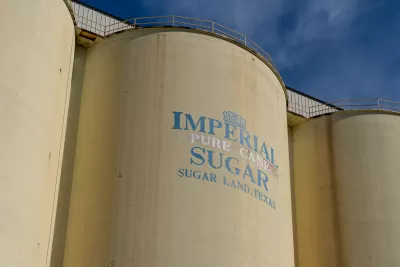The southeast Texas city is responding to community demands for safer, more accessible, and more diverse transportation choices.

Sugar Land, Texas,is adopting a new Mobility Master Plan aimed at aligning the goals and proposals in prior mobility, roadway, and bike and pedestrian plans and improving mobility for all types of road users in the sprawling, heavily car-oriented city southwest of Houston.
An article in the Fort Bend Independent quotes the master plan, which states:
For decades Sugar Land has successfully invested in mobility, primarily by building new streets and trails and increasing vehicular capacity.
To complement these investments, the community has asked the City to expand safe, healthy, and active transportation choices for all users, and continue to deploy mobility technology and update design treatments to optimize the space on existing streets.
The plan highlights the interconnectedness of transportation and land use policies, noting that “City staff should integrate public health considerations into all facets of transportation decision-making. This includes expanding greenspace for healthy activities, improving air quality, and ensuring that everyone can access their day-to-day destinations without a car.”
According to the plan, “the City must strategically re-imagine existing street corridors, build on innovative Intelligent Transportation System (ITS) investments, and adapt existing programs and policies to meet the evolving needs of the community.”
The plan establishes six ‘mobility metrics’ and a framework for tracking progress. “This plan identifies focus corridors for investment in a connected Transformative Mobility Network (TMN). Alongside this network, targeted Strategies & Action Items detail the projects, programs, and policies for the City to pursue over the next decade.”
The plan adds, “This Strategy supports further investment in the existing demand response and park & ride services within Fort Bend County while also exploring other options, including microtransit, that support connectivity and access for Sugar Land residents, businesses, and commuters.” As part of the city’s goal to provide more transportation options, in May, the city applied for a grant from the Houston-Galveston Area Council (H-GAC) to establish an on-demand microtransit pilot program.
FULL STORY: Sugar Land Reimagines The City’s Future With A New Mobility Master Plan

Study: Maui’s Plan to Convert Vacation Rentals to Long-Term Housing Could Cause Nearly $1 Billion Economic Loss
The plan would reduce visitor accommodation by 25,% resulting in 1,900 jobs lost.

North Texas Transit Leaders Tout Benefits of TOD for Growing Region
At a summit focused on transit-oriented development, policymakers discussed how North Texas’ expanded light rail system can serve as a tool for economic growth.

Using Old Oil and Gas Wells for Green Energy Storage
Penn State researchers have found that repurposing abandoned oil and gas wells for geothermal-assisted compressed-air energy storage can boost efficiency, reduce environmental risks, and support clean energy and job transitions.

Private Donations Propel Early Restoration of Palisades Playground
Los Angeles has secured over $1.3 million in private funding to restore the Pacific Palisades playground months ahead of schedule, creating a modern, accessible space that supports community healing after recent wildfires.

From Blight to Benefit: Early Results From California’s Equitable Cleanup Program
The Equitable Community Revitalization Grant (ECRG) program is reshaping brownfield redevelopment by prioritizing projects in low-income and environmental justice communities, emphasizing equity, transparency, and community benefits.

Planting Relief: Tackling Las Vegas Heat One Tree at a Time
Nevada Plants, a Las Vegas-based nonprofit, is combating the city’s extreme urban heat by giving away trees to residents in underserved neighborhoods, promoting shade, sustainability, and community health.
Urban Design for Planners 1: Software Tools
This six-course series explores essential urban design concepts using open source software and equips planners with the tools they need to participate fully in the urban design process.
Planning for Universal Design
Learn the tools for implementing Universal Design in planning regulations.
Ascent Environmental
Borough of Carlisle
Institute for Housing and Urban Development Studies (IHS)
City of Grandview
Harvard GSD Executive Education
Toledo-Lucas County Plan Commissions
Salt Lake City
NYU Wagner Graduate School of Public Service





























